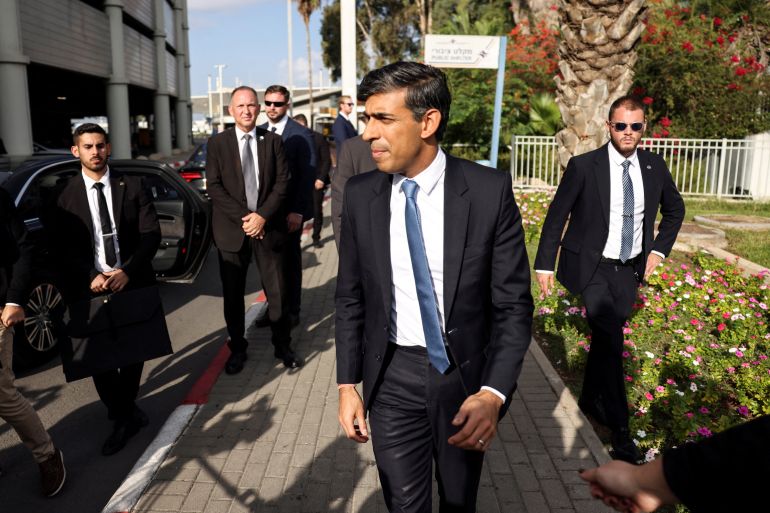UK’s PM Rishi Sunak in Israel. What’s on his agenda?
As Rishi Sunak meets officials in Tel Aviv, here is a look at Britain’s current dynamic and history with Israel.

British Prime Minister Rishi Sunak on Thursday landed in Tel Aviv to “express solidarity with the Israeli people” as non-stop Israeli bombardment of the Gaza Strip destroyed residential buildings and killed more than 3,400 Palestinians.
“I am proud to stand here with you in Israel’s darkest hour,” Sunak said in a news conference with Israeli Prime Minister Benjamin Netanyahu. “We will stand with you in solidarity. We will stand with you and your people. And we also want you to win.”
Keep reading
list of 3 itemsA love story born in Gaza’s bombed Ahli Hospital
‘This is genocide, not war’: Gaza destruction sparks protests across world
Britain has stood shoulder to shoulder with Israel in the wake of the Hamas attack on Israeli soil that killed more than 1,400 people. Hamas also took at least 199 people captive.
The trip came as the mounting death toll triggered protests across the Middle East, with fears the Israel-Palestine conflict may escalate into a wider regional war.
Sunak’s office told the Reuters news agency he would be “sharing his condolences” for the loss of life in both Israel and Gaza, warning against further escalation.
Here’s a look at Britain’s impact on the region.
What came of Sunak’s visit?
Reporting from Tel Aviv, Al Jazeera correspondent Alan Fisher said that Sunak’s declaration on wanting Israel to win was “pretty declarative”.
There was, Fisher noted, “no mention of the fact Israelis have cut off food water and energy from the Gaza Strip, which many would consider a breach of international law”.
Framing the current conflict as a battle between the “forces of progress and humanity” and “an axis of evil”, Netanyahu called Hamas “the modern barbarians, the worst monsters on the planet”.
Indicating that Israel was in it for the long haul, Netanyahu had made it clear he expected allies like Sunak to still be there when things get rough, said Fisher.
Britain’s decision to abstain from Wednesday’s UN Security Council vote on a resolution calling for Israel to allow humanitarian aid into Gaza largely passed below the radar. The resolution was blocked by the United States on the basis that it did not explicitly mention Israel’s right to self-defence.
Having declined to take a position on Wednesday, Sunak nevertheless pushed for the humanitarian corridor through the Rafah border crossing with Egypt during an earlier meeting with Israeli President Isaac Herzog.
The two leaders underlined the need to cool the hot conflict. “The prime minister and President Herzog stressed the imperative need to avoid further escalation of violence in the region,” Sunak’s office said in a statement.
Rights groups say the Israeli siege of Gaza amounts to collective punishment and a war crime.
Gerry Hassan, a Scottish writer and commentator, said the meeting highlighted the “mismatches” in British and Western politics. “In the post-Cold War world, the West claims it stands for international law and then stands for oppression elsewhere, showing its defence of democratic and human rights is threadbare,” he said.
Sunak is headed to Saudi Arabia for crisis talks with Crown Prince Mohammed Bin Salman. Prior to the attacks, Israel had been close to clinching a diplomatic rapprochement with Saudi Arabia.
The whirlwind tour of the Middle East is part of coordinated efforts with foreign secretary, James Cleverly, who is in Egypt and will visit Turkey and Qatar over the next three days.
What is Britain’s history in Palestine?
Ask most Palestinians what lies at the root of their plight and they’ll likely blame Arthur Balfour.
It was back in 1917, while serving as Britain’s foreign secretary, that Balfour pledged to create a “national home” for Jewish people in Palestine in the Balfour Declaration.
Britain had been in charge of Palestine – home to a Jewish minority and an Arab majority – since defeating the Ottoman Empire in World War I.
After the Balfour Declaration, Jewish people fleeing persecution in Europe started arriving in greater numbers, particularly during the Nazi Holocaust in World War II.
Britain withdrew in 1948, when Jewish leaders announced the creation of the State of Israel and Jewish militias went on a rampage against Palestinians forcing them to flee.
About 750,000 Palestinians were displaced in a campaign of ethnic cleansing, some ending up in Jordan, Lebanon and Syria, and the rest squeezed into the remaining territory in Gaza, the West Bank and East Jerusalem. The Palestinians call the forced displacement the Nakba, Arabic for catastrophe. In 1967, Israel captured the remaining Palestinian territories – a step not recognised by the international community.
What is Britain’s relationship with Israel?
Britain has a strong relationship with Israel, but the two allies don’t always agree on some foreign policy issues.
In March, Israeli Prime Minister Benjamin Netanyahu visited London for talks with Sunak, with Iran topping the agenda. While Britain has imposed sanctions on Israel’s biggest foe, it has not gone as far as Netanyahu would like, stopping short of designating Iran’s Islamic Revolutionary Guard Corps as a “terrorist” organisation.
Sunak also used the talks to express his concern over Netanyahu’s controversial judicial overhaul.
There have been some rocky moments in the past. Britain slapped an arms embargo on Israel following the latter’s 1982 invasion of Lebanon.
With the relationship under strain, Israel’s then-Prime Minister Menachem Begin approved a weapons deal with Argentina in 1982, which was fighting Britain in the Falklands War.